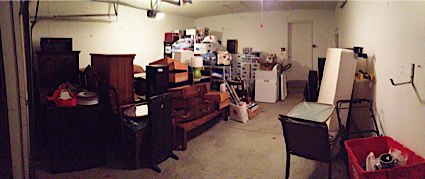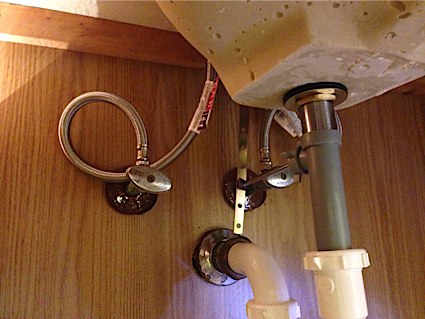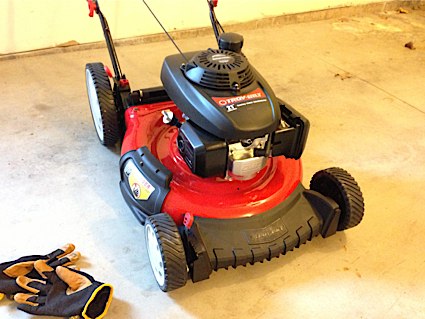Note: many of my suggestions are linked to products I recommend from Amazon.com—using these links when you purchase one of them helps me keep this article and site fresh!
In the past few years, I've moved three times; from a dorm room to a two-bedroom apartment, from that apartment to a two-bedroom condo, and from that condo to a house. I'm not claiming to be a moving expert, but the moves have gone very well every time.

It's nice to know that pretty much everything we own fits in a two-car garage (for now!).
The physical move itself is a very small part of migrating to a new place—it's the weeks of work getting 'settled in' afterwards that can make a move a nightmare, or a great experience. The tips, tricks, and tools I recommend below are things that have really helped me make the days and weeks following the move be a great experience.
Triage
The first few days after you move all your stuff (clothes, boxes, appliances, furniture) into your new place are the most important. Hopefully, you've been able to inspect your new home before moving in, and you know some of the things that you need to fix right away—a broken faucet, a dead electrical outlet, a stuck door handle.

Plumbing was usually at the top of my triage list. I don't like plumbing.
Before you move (or as soon as you can after), put all the big things you need to do into a list, and prioritize this list. Focus on a few different categories:
- Can't sleep until this is done. This includes things like making sure a porch light works and your doors close and lock, as well as anything related to heating/cooling, or possible safety problems. Do these the day you move in, or the next day.
- Need to do before finishing the move. The messy stuff—painting, cleaning carpets, repairing holes in walls. You shouldn't put furniture into the rooms you'll need to work on until you're finished with the work.
- Really want to do. You want to mount a TV and speakers on a wall? This is important, but you can definitely set the TV on a table for the first couple weeks, until all your 'need to do' tasks are finished. These are things that aren't really in the way of your daily living, or doing other important tasks.
- Nice-to-haves. These are things you might never do. Write them down anyways, because you'll still want to do them someday, if you live in the same place long enough; a fresh veggie garden, a kitchen remodel, crown molding in a room. These are things that are not that important, but would make your house even more of a home.
Try to stick to your list, and work from top to bottom. I use Google Docs so I can share this list (and extra thoughts/comments) with other people who are helping me accomplish these tasks.
Handy Books
There are two books that I've found invaluable in my home improvement projects over the past few years (both in the condo and in my home), and they're both published by the Home Depot:
Unless you're a carpenter or an incredible handyman already, you're going to need help with even the simplest projects (especially plumbing!). These books have great illustrations and cover different styles of wiring, faucets, toilets, drywall, etc. for almost any situation. I often look to these books first when attempting a project, then do an obligatory YouTube search for a how-to video.
Tutorials found on Google and YouTube are hit-or-miss; sometimes, they will give you that light-bulb moment when you know exactly what you need to do, but other times, you'll just be confused by the poorly-illustrated guide or the less-than-accurate description of what you need to do. The books I mention here are almost spot-on every time, and don't take any effort to crack open. Just leave them near your staging/tool area (mentioned later) and easily accessible for a while.
Keep a List of Needed Items and Nice-to-Haves
I use Amazon.com for almost all my purchases if I don't need the thing for a couple days (I'm a Prime member, so I know everything I order will arrive within two days anyways). If I think of anything I need—even if it's just a scissors, a pack of post-it notes, or a roll of Blue tape, I'll whip out my smartphone, search it on Amazon, and add it to my shopping cart.
Once a day, I'll go into my shopping cart on my computer and sort the items—necessities will either be written on a list to buy at the hardware store (if I need them NOW), or purchased that night; nice-to-haves (like a set of leaf picker-upper claws or a bunch of energy-saving replacement light bulbs) will be put into a wish list for later perusal.
Have a Staging/Tool Area
One of the first things I did on moving day was set up a folding table (I just used a little 4' folding table) in the middle of the house, and put all my tools, spare parts, painting supplies, and chargers on and under that table. For a few days, this was incredibly convenient for me and everyone else who was helping with little around-the-home fixes, repairs, and improvements.
Instead of having to go up and down stairs every few minutes to grab a tool I forgot I just walked to the middle of the house and grabbed it. Try to return all your tools back to this staging area after you finish for the night, or when you finish a little task—otherwise, tools will end up missing when you need them most (like when a pipe starts leaking, and you left your wrench in a cabinet somewhere!).
Yard Tools

I bought a nice push mower with a Honda engine. It's served me well so far!
If you're moving into a home with any kind of yard, and don't have lawn service, make sure you have at least the following yard tools:
- Leaf Rake (useful for more than just leaves!)
- Lawn mower (and a gas can, unless you go electric)
- Trimmer
- Pruning shears
There are a thousand other tools that you'll accumulate over the years, but these essentials will get you up and running quickly. The rake isn't really essential until late summer, but it's still helpful for a multitude of outdoor tasks, like gathering up bits of branches or plants you've cut up.
General Tools
Some places sell basic tool kits for homeowners. I don't like these kits, because every tool is 'okay'. I'd rather build up my own kit of tools that are very good. I typically research each tool I buy, and make sure it's the best one I can get for the price—I don't have any brand loyalty, I just want the tool that gets the job done well, over and over. Here are the tools I've had to grab a hundred times since moving in:
- Claw Hammer
- Cordless Drill (with a drill bit set)
- 6-in-1 Screwdriver (this one is the best I've ever used, by far!)
- Drywall scapers and putty knifes (2" and 4")
- Adjustable wrench
- Adjustable pliers
- 12' Tape Measure
- 2+ pairs of scissors
- Linesman pliers (great for cutting wires and pulling things)
- Stud finder
- Outlet tester
- Electricity (AC voltage) detector
- Step stool (at least) or 6' Ladder
Work clothes
Make sure you change into an outfit you don't care about when doing things like painting, spackling, plumbing, or even just changing out a vent in the floor. There are bits of dirt, paint, dust, and other things that will get on you no matter how careful you are. Make sure you don't ruin your favorite shoes or shirt!
I typically keep a couple old pairs of jeans or sweatpants, an old pair of tennis shoes, and a few old shirts that I won't ever wear in public again, and wear them when doing house work.
Pace Yourself
Make sure you pace yourself! Don't try to do every 'nice-to-have' in the first week. Get the most important things done quickly, but make sure you take breaks, sleep, eat, and do all those normal things, even on moving day!
You'll be less energetic, and accomplish less, if you try to fly through all your projects at once. Pace yourself, do a good job on everything, and make sure you take care of yourself (and your family, if you have one living in your new place!).
Have your parents/known handyman's phone number on speed dial
There are many little problems and bits of your house that you won't have a clue about. What is the name of the plumbing part that I just broke that's causing a flood, and how do I get another? Who should I call if I need a limb removed from my yard? What do I do if I need to dig a hole on the side of my house, but don't know if it's safe?
Have a trusted friend, a parent, or some other long-term homeowner who you trust (and who hasn't let their home turn to shambles) in your phone's favorites, and ask them if it would be okay if you call them rather continuously throughout your first few weeks at the house.
Don't be shy—asking someone who knows the solution to your problem instead of spending an hour researching the solution yourself is a huge time-saver, and could end up saving you money as well. For instance, there are many plumbing problems you can easily solve yourself that just involves the proper knowledge and a five-dollar replacement part—instead of paying a plumber over $100 and waiting a day or two to get it fixed, consult your 1-2-3 Plumbing book or ask a friend how to fix it. Heck, if it's too hard for you to fix, offer the friend a free lunch and see if the friend will do it for you!
Know the Closing Times of Local Hardware Stores
I'm very fortunate to be in the middle of many different home improvement stores, hardware stores, and other stores where I can get things in an emergency. Know when these stores close, so you can know when to NOT do a certain project that might require a washer or valve to finish, or an extra can of paint.
Plan for the worst, especially when it comes to plumbing and painting—if you break a valve, and have to shut off your main water supply until you get a part to fix it or a plumber, you're going to regret starting your project after all the hardware stores closed!
Know where the closest stores are:
- Lowes
- Home Depot
- Ace Hardware
- True Value
- Sears
- Menards
- (other local stores—sometimes these stores give you better service, since they know that's their main advantage over other 'big box' retailers).
Odds and Ends
A few things that you should do as soon as possible (if they haven't been done yet) to make sure your house will be safe and secure:
- Test for Radon (I used this First Alert Radon kit; you just set a little tray in your basement for two days, then ship it to a lab. It's only $12). Some homes have radon levels that cause just as much harm as smoking packs of cigarettes per day!
- Test your water quality (I used this water test kit). You might want to invest in a water softener, or at least make sure you clean your pipes and faucets now and then if you have hard water. Especially good to do in older homes.
- Look around your basement or crawlspace, and under sinks, and make sure there are no leaks after a few days—if the home has been vacant for a while, your use of the pipes may have been enough to cause a problem or two.
- Try to get at least a few rooms set up completely within a week or two. You need somewhere to relax after a hard day of moving and fixing things!